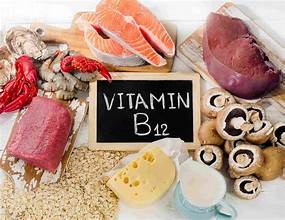Vitamin B12, also known as cobalamin, is a crucial nutrient that plays a vital role in your body’s overall health. From supporting red blood cell production to boosting energy levels and ensuring nerve health, this essential vitamin is indispensable. In this guide, we’ll break down everything you need to know about Vitamin B12, including its sources, benefits, and how to prevent a deficiency.
What is Vitamin B12?
Vitamin B12 is a water-soluble vitamin that contains cobalt, earning it the name cobalamin. It supports:
- Red blood cell production
- DNA synthesis
- Central nervous system development
- Healthy hair, skin, and nails
Forms of Vitamin B12
There are four main forms of Vitamin B12:
- Methylcobalamin and Adenosylcobalamin (found in animal products)
- Hydroxocobalamin (used in injections for deficiency)
- Cyanocobalamin (synthetic form found in supplements)
Key Benefits of Vitamin B12
1. Supports Red Blood Cell Formation
Vitamin B12 aids in the production of healthy red blood cells, which are essential for oxygen transport. A deficiency can lead to anemia, causing symptoms like fatigue and weakness.
2. Boosts Energy Levels
If you’re experiencing fatigue, low Vitamin B12 levels might be the culprit. Proper levels can help restore your energy and improve your mood.
3. Enhances Nerve Health
Vitamin B12 helps maintain the myelin sheath, which protects nerves and ensures effective communication between the brain and the rest of the body. Deficiencies can cause numbness, tingling, or muscle weakness.
4. Improves Mood and Cognitive Function
Vitamin B12 plays a role in producing chemicals that regulate mood. Low levels have been linked to depression and reduced cognitive function.
Risks of Vitamin B12 Deficiency
1. Anemia
A lack of Vitamin B12 can lead to fewer and abnormal red blood cells, causing symptoms like:
- Fatigue
- Weakness
- Pale skin
2. Neurological Issues
Vitamin B12 deficiency can result in:
- Memory loss
- Coordination problems (Ataxia)
- Vision problems
3. Long-Term Risks
Prolonged deficiency may cause:
- Cognitive decline
- Nerve damage
- Tingling or numbness in extremities
Who Should Consider Vitamin B12 Supplements?
Certain groups are more likely to need supplementation:
- Vegans and Vegetarians: B12 is naturally found in animal-based foods, so plant-based eaters may need fortified foods or supplements.
- Older Adults: Aging reduces stomach acid, making it harder to absorb B12 from food.
- Individuals with Medical Conditions: Conditions like Crohn’s disease or pernicious anemia can impair absorption.
Top Sources of Vitamin B12
Animal-Based Sources
- Meat (beef, chicken)
- Fish (salmon, tuna, trout)
- Dairy products (milk, cheese, eggs)
- Organ meats (liver, kidney)
Plant-Based Options
- Nutritional yeast
- Seaweed
- Fortified foods like cereals and plant-based milk
Supplements vs. Injections: What’s Best?
Vitamin B12 Injections
Ideal for individuals with absorption issues due to medical conditions, B12 injections deliver the vitamin directly into the bloodstream.
Pros:
- Fast absorption
- Effective for severe deficiencies
Cons:
- Expensive
- Possible side effects: rashes, nausea, headaches
Vitamin B12 Supplements
Supplements are more affordable and suitable for individuals without absorption issues.
Pros:
- Cost-effective
- Convenient
Cons:
- Less effective for people with absorption problems
Always consult your doctor before starting supplements or injections.
Tips for Proper Dosage and Absorption
- Recommended Daily Dose: 2.4 micrograms for adults.
- Ensure a balanced diet with B12-rich foods like chicken, seafood, or fortified cereals.
- Avoid Vitamin C supplements alongside B12, as they can reduce absorption.
Key Takeaways
- Vitamin B12 is essential for energy, nerve health, and red blood cell production.
- Deficiency risks include anemia, nerve damage, and cognitive decline.
- Supplementation is crucial for vegans, older adults, and individuals with absorption issues.
For any symptoms or concerns, consult a healthcare provider to discuss blood tests, supplements, or injections to maintain optimal health.

